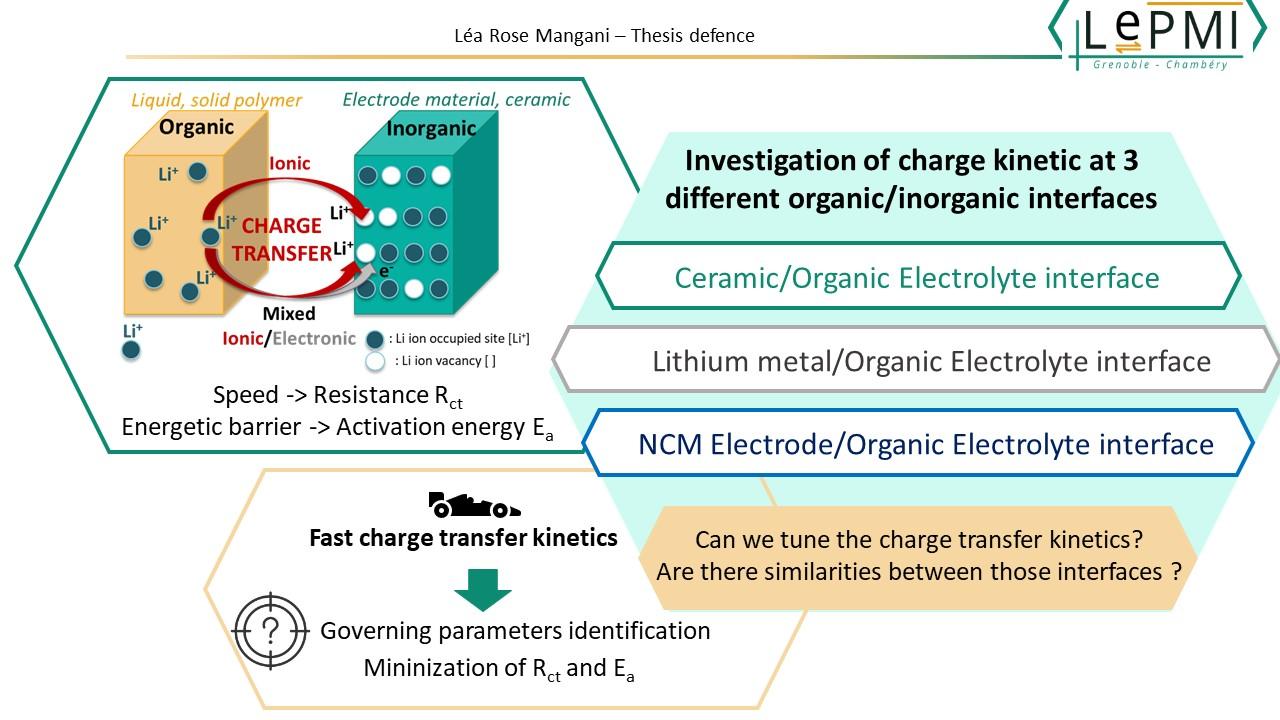
Abstract : Li-ion batteries are omnipresent in our day-to-day life in the electronic devices (mobile phone, laptop), but also start to be integrated in the electric mobility market and stationary energy storage (plants). However, limited power and energy densities, safety and cost remain the main bottleneck that impeded the massive mobility electrification. To overcome those challenges, new battery technologies have emerged the so-called all-solid-state-batteries (ASSB). The key aspect relies on the substitution of (flammable) liquid electrolyte with non-flammable solid one, enhancing the safety, and on the usage of metallic lithium as negative electrode to increase energy density. Unfortunately, switching from liquid to solid electrolyte is not straightforward and there are still some specific challenges to tackle. Particularly, the ionic conductivity of the solid that are several order of magnitude lower than liquid counterparts and the interfacial contact between the solid electrolyte, the composite and lithium metal electrode is far from optimal.
To date, several solid electrolytes are currently studied, including inorganic ceramics (such as LLTO, LLZO, LATP, etc…) and solid polymer electrolytes. The former has a reasonable ionic conductivity but a poor mechanical stability whereas the latter provides the opposite features. Therefore, composite electrolyte, resulting from an intimate mixture of ceramic particle and polymer, emerged as a promising alternative offering a possible synergetic combination of their properties. However, the reported results on composite electrolyte are very scattered and even, contradictory which raises fundamental questions about the ionic transport mechanism within composite electrolyte and particularly regarding the ionic transport/transfer process at polymer/ceramic interfaces.
Generally, charge transfer mechanism (either ion and/or electrons) and the interfacial reactivity (electrode/electrolyte, polymer/ceramic) are of major concern in the development of the next generation of battery. Their understanding is essential for the modeling and the design of advanced battery.
In this thesis, we propose a systematic investigation of the charge transfer reaction at different organic/inorganic interfaces embedded in composite electrolyte (ceramic/electrolyte), composite electrode (active material/electrolyte), and at lithium metal/electrolyte interface. The first goal is to develop and adapt experimental methods to study each of these interfaces. A large panel of electrochemical and physico-chemical characterisation techniques have been performed to characterize them: electrochemical impedance spectroscopy, potentiostatic cycling, X-ray photoemission spectroscopy (XPS), scanning electron microscopy, etc… From this work, some governing parameters of these organic/inorganic interface have been identified such as ceramic surface chemistry, ionic conductivity, and salt concentration of the organic phase. Based on the combination of these results, we can propose a kinetic model of charge transfer reaction mechanism at organic/inorganic interface.
La soutenance se tiendra devant le jury suivant :
- Monsieur Hubert Girault
- Monsieur Vincent Vivier
DR, CNRS, Sorbonne University, Rapporteur
- Monsieur Ivan Luas
MDC, Sorbonne University, Examinator
- Monsieur Marian Chatenet
Professor, Grenoble INP, Examinator
- Madame Marion Chandesris
Research engineer, CEA LITEN, Examinator
- Monsieur Didier Devaux
- Monsieur Renaud Bouchet
Professor, Grenoble INP, Thesis director
Visitors:
Monsieur Christian Jordy, SAFT Bordeaux.


